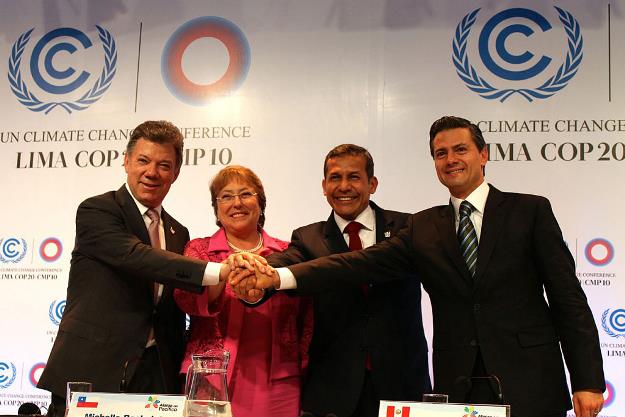When President Donald Trump announced that the U.S. was abandoning the Paris Agreement, he not only undermined U.S. national interests but also abdicated the country’s global leadership role on climate change. Latin American countries, which had worked with the Obama administration to reach a new global agreement, have rejected Trump’s position and instead reaffirmed their commitment to the accord.
This stark break was evident at the G20 Summit in Hamburg, Germany, where the U.S. was left isolated as the other 19 countries, including Argentina, Brazil and Mexico, were united in their statement that the Paris Agreement is “irreversible.”
The region has much to gain from bucking Trump and strengthening its agenda on climate change – and some new challenges to face. Here are some of the principal elements to consider:
First, the region is extremely vulnerable to climate change impacts. These are already being felt and pose a serious threat to hard-earned development gains. Earlier this year, a coastal El Niño caused heavy rains in Peru and Colombia that resulted in catastrophic floods and mudslides, killing over 400 people and leading to billions of dollars of damages.
These extreme climatic events are becoming more frequent and intense due to global warming. The Inter-American Development Bank estimates that damages in the region caused by climate impacts such as increased drought, floods and sea level rise associated with a rise of two degrees Celsius will likely approach $100 billion a year by 2050.
As Latin American countries are only responsible for roughly 9 percent of global emissions, they strongly support the UN’s principal role in encouraging the world’s biggest emitters to take the lead on emissions reductions to avoid dangerous climate change.
Second, most Latin American countries support the agreement for economic self-interest. Many now regard the transition to a low-carbon and climate-resilient economy not only as a way to manage climate impacts but also as a path to prosperity and increased competitiveness.
Global action on climate change has been a key driver behind the growth of clean energy. The deployment of renewable energy has progressed in Latin America as the cost of technologies fell and the regulatory environment improved. In 2015, the number of countries in the region with renewable energy targets nearly doubled compared to the year before. The International Finance Corporation estimates that the region could attract $1 trillion in clean energy investment opportunities by 2040, of which $600 billion is expected to materialize by 2030, with Brazil, Chile and Mexico representing over half of the investment potential.
Some countries are well-placed to implement the accord. Many were “inadvertent pioneers” after developing new approaches to forestry protection, building up their hydroelectric capacity, and designing innovative urban transport systems. These innovations were motivated not by climate change but other concerns, such as enhancing energy security.
Despite some progress, there remain substantial challenges to implementing the agreement such as fossil fuel subsidies, which waste valuable resources that could be better spent building up resilience to climate impacts, investing in electric public transport systems and protecting tropical forests.
Third, the Paris Agreement is a success story for Latin American diplomacy and requires defending. Over the last decade, Mexico, Brazil, Peru, Chile, Colombia and others from the region played major roles in shaping the agenda at the UN climate negotiations, bringing countries together for constructive dialogue and establishing the contents of the Paris Agreement.
In a multipolar world, Latin American countries have a preference for an international rules-based system, which they regard as crucial to protect their sovereignty and solve global challenges. The support for multilateralism reveals a more assertive foreign policy; and in the case of climate change, this means an explicit rejection of the Trump administration’s position.
These countries, with their relatively low emissions and clean energy matrices, identified the UN climate negotiations as a space to enhance their global standing. By adopting ambitious positions, some countries banked on the idea that if they could demonstrate their own will to act, this could help increase overall global ambition, which in turn could help reduce global emissions and decrease their vulnerability.
Fourth, walking away from the agreement would severely reduce Latin America countries’ ability to pressure developed countries to deliver on their financial commitments. Developed countries are on the hook to support developing countries with $100 billion per year from 2020 in finance as well as support through capacity building and technology transfer measures to help them confront global warming.
Meeting this financial commitment will be harder given the Trump administration’s announcement that it will stop payments to the Green Climate Fund, which supports countries’ efforts to reduce their emissions and adapt to the impacts of climate change. To date, the U.S. has contributed $1 billion out of a total pledge of $3 billion made by the Obama administration to the fund.
Latin America cannot face the threats from climate change alone, or without financial support. These countries should bolster their partnerships with Europe, Canada and China to help fill the void on international cooperation on climate change being left by the U.S.
Trump’s decision to leave the Paris Agreement was rebuked across Latin America. Remaining part of the agreement serves these countries’ interests especially as they confront worsening climate impacts and take advantage of the opportunities for a more sustainable and resilient form of development.
That said, fighting global warming requires a strong team effort. Latin American countries are determined to remain on the winning side.
—
Guy Edwards is research fellow and co-director of the Climate and Development Lab at Brown University. Isabel Cavelier is senior adviser at Mission2020, and co-founder and co-director of Transforma.





